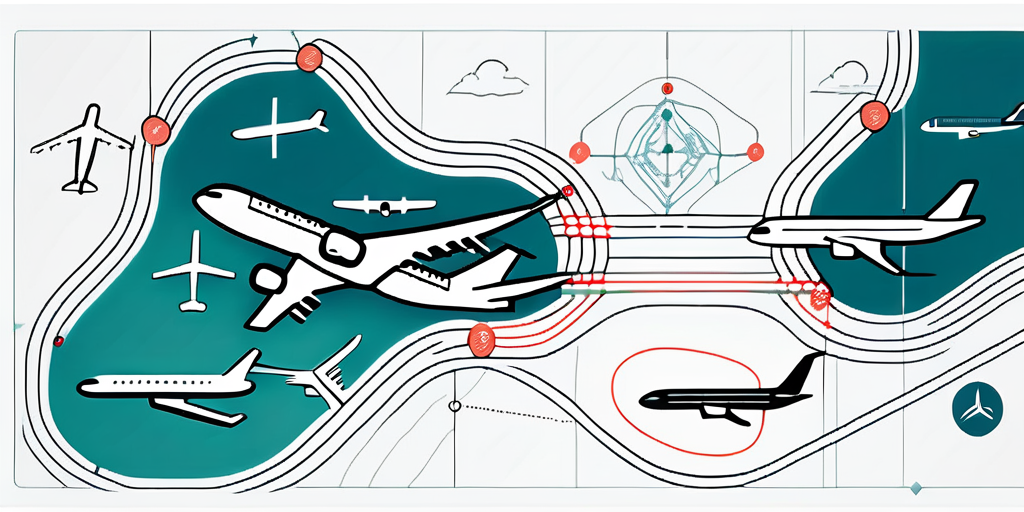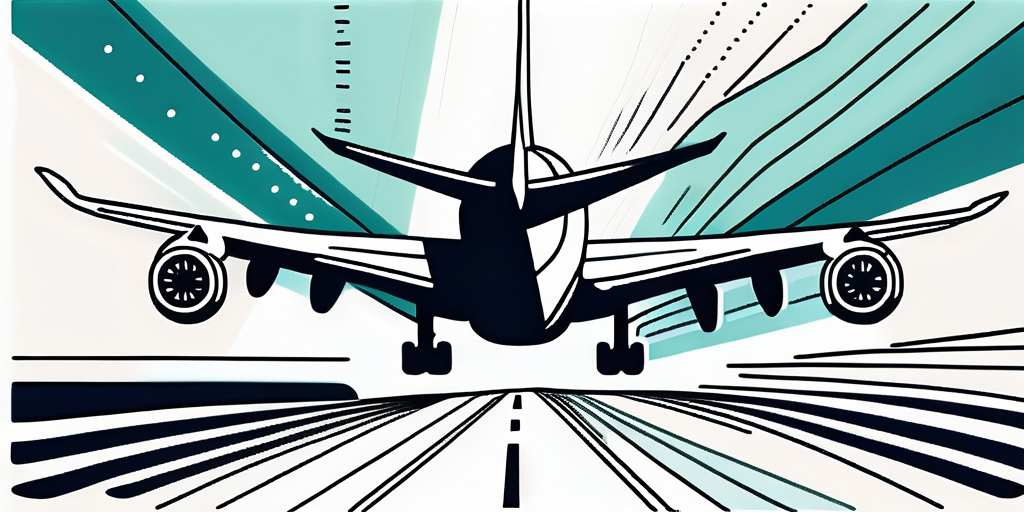Skipping Connecting Flights: Risks and Alternatives
Learn about the risks and alternatives of skipping connecting flights. Discover tips and considerations for smoother travel experiences.
Skipping connecting flights can be a savvy way to save time and travel more efficiently. However, understanding the basics of connecting flights is crucial before you embark on this adventure. Let's dive deep into the world of skipping connecting flights and explore the advantages and potential drawbacks associated with this travel strategy. We'll also provide you with tips on booking direct flights, navigating airline policies, and making the most of your journey. So fasten your seatbelts and get ready for the ultimate guide to skipping connecting flights.
Understanding the Basics of Connecting Flights
Before we explore the world of skipping connecting flights, let's first understand what a connecting flight actually is. A connecting flight is a leg of your journey where you have to change planes and possibly airlines at an intermediary airport. This is done to reach your final destination. Connecting flights are commonly used by airlines to consolidate passengers from different origins to a common destination. They can save costs for the airlines and provide passengers with more travel options.

But why do airlines use connecting flights in the first place? Let's find out.
What is a Connecting Flight?
A connecting flight is a flight where you have to change planes at an intermediate airport to reach your final destination.
Why Do Airlines Use Connecting Flights?
Airlines use connecting flights for various reasons. Firstly, connecting flights allow them to serve a larger number of destinations without having to operate direct flights. This saves costs on aircraft and personnel. Additionally, by consolidating passengers onto fewer flights, airlines can maximize their aircraft's capacity and increase overall efficiency. Connecting flights also give passengers more flight options and allow airlines to optimize their route networks.
Moreover, connecting flights can be beneficial for passengers in terms of flexibility. They offer travelers the opportunity to visit multiple cities or countries in one trip, even if those locations are not directly connected by a non-stop flight. This can be especially advantageous for those looking to explore different destinations or for business travelers needing to attend meetings in various locations.
Another advantage of connecting flights is the potential cost savings for passengers. In some cases, opting for a connecting flight instead of a direct one can result in a more affordable ticket price. This can be appealing for budget-conscious travelers or those looking to maximize their travel budget for other experiences during their trip.
The Pros and Cons of Skipping Connecting Flights
Now that we understand the basics of connecting flights, let's explore the pros and cons of skipping them.

When it comes to skipping connecting flights and opting for direct flights, there are a few additional factors to consider. Direct flights not only save time and reduce travel fatigue but they also provide a more seamless travel experience. Passengers can enjoy the convenience of staying on the same aircraft for the entire journey, without the hassle of disembarking and reboarding. This can be particularly beneficial for those who prefer continuity in their travel and value uninterrupted relaxation or work time during the flight.
Furthermore, direct flights offer a sense of security and peace of mind for travelers, as there is a lower likelihood of encountering issues such as missed connections or flight disruptions. By choosing a direct flight, passengers can avoid the stress and uncertainty that may come with navigating multiple flights and transit points. This can lead to a more enjoyable and stress-free travel experience overall.
Advantages of Direct Flights
Skipping connecting flights and opting for direct flights can offer various advantages. Firstly, direct flights save time and reduce travel fatigue. You don't have to worry about rushing through airports, changing planes, and dealing with potential delays. Direct flights also eliminate the risk of misconnecting or losing your baggage during transit. Additionally, direct flights can be more convenient for travelers with limited mobility, families with young children, or those carrying heavy luggage.
Potential Drawbacks of Avoiding Connecting Flights
While skipping connecting flights certainly has its advantages, there are also some potential drawbacks to consider. Direct flights may not always be available for your desired destination or travel dates. They can also be more expensive than flights with layovers. Moreover, direct flights may have limited availability, especially for remote or less popular destinations. Additionally, opting for direct flights may limit your choice of airlines, as not all carriers offer non-stop routes to every destination.
Strategies for Booking Direct Flights
Now that you understand the pros and cons of skipping connecting flights, let's explore some strategies for booking direct flights.
When it comes to booking direct flights, there are a few additional factors to consider that can enhance your overall travel experience. Opting for a non-stop flight not only saves you time and potential stress from layovers but also reduces the likelihood of lost luggage or flight delays that can often occur during connecting flights. Direct flights are particularly advantageous for those with tight schedules or those who prefer a more seamless travel experience.
Best Websites for Finding Direct Flights
When booking direct flights, it's essential to use websites that specialize in providing comprehensive search results for non-stop routes. Some popular websites for finding direct flights include Skyscanner, Kayak, and Google Flights. These platforms allow you to filter your search specifically for non-stop flights, making it easier to find the most convenient options for your travel needs.
Moreover, these websites often offer additional features such as fare alerts, flexible date options, and comparison tools to help you secure the best deals on direct flights. By utilizing these resources, you can streamline your search process and potentially uncover hidden gems in terms of flight availability and pricing.
Tips for Booking Direct Flights
Booking direct flights can be a breeze if you keep a few tips in mind. Firstly, be flexible with your travel dates and destinations. This will increase your chances of finding available non-stop flights. Additionally, booking directly with the airline's official website or through a reputable travel agent can sometimes provide better deals and greater flexibility in case of flight changes or cancellations. Lastly, keep an eye out for special promotions or discounts that airlines may offer for direct flights.
By following these tips and utilizing the right resources, you can navigate the process of booking direct flights with ease and confidence. Whether you're planning a quick business trip or a relaxing vacation, opting for non-stop routes can significantly enhance your travel experience and ensure a smoother journey from takeoff to landing.
Navigating Airline Policies on Direct Flights
Now that you know how to book direct flights, let's delve into understanding airline policies and regulations associated with this travel option.
When it comes to direct flights, it's not just about booking your ticket and boarding the plane. Each airline has its own unique set of rules and regulations that govern the entire travel experience. These policies cover a wide range of aspects, from baggage allowances to check-in procedures, and even additional charges that may apply specifically for direct flights. By taking the time to familiarize yourself with these airline policies, you can ensure a smooth and stress-free journey from start to finish.
Understanding Airline Rules and Regulations
Each airline has its own set of rules and regulations regarding direct flights. It's important to familiarize yourself with these policies before booking your flight. Pay attention to baggage allowances, check-in procedures, and any additional charges that may apply for direct flights. By understanding the airline's policies, you can ensure a smooth and hassle-free travel experience.
Moreover, airline policies can also extend to other areas such as onboard amenities, seating arrangements, and even in-flight entertainment options. Some airlines may have specific rules regarding electronic devices usage or meal preferences. By being well-informed about these policies, you can make the most out of your direct flight experience and avoid any surprises along the way.
Dealing with Flight Delays and Cancellations
While direct flights can minimize the chances of delays and cancellations, unforeseen circumstances can still occur. In case of a delay or cancellation, it's important to know your rights as a passenger. Familiarize yourself with the airline's policies regarding compensation, rebooking options, and assistance provided during such situations. Being well-informed will help you navigate any potential disruptions during your journey.
Additionally, it's worth noting that some airlines have specific protocols in place for handling unexpected situations like weather-related delays or mechanical issues. Understanding how the airline deals with these scenarios can give you peace of mind and confidence while traveling. Remember, being prepared and informed is key to ensuring a seamless travel experience, even when faced with unexpected challenges.
Making the Most of Direct Flights
Now that you're equipped with the knowledge of booking and navigating direct flights let's explore how to make the most of your journey.

How to Stay Comfortable on Long Direct Flights
Long direct flights can sometimes be a challenge, but with a few tips, you can make your travel experience more comfortable. Dress in layers to accommodate changing cabin temperatures, stay hydrated by drinking plenty of water, and keep yourself entertained with books, movies, or music. Taking short walks during the flight and doing simple exercises can also help prevent muscle stiffness and blood clots.
Maximizing Your Time on Direct Flights
Direct flights provide an excellent opportunity to maximize your time and make the most of your journey. Use this uninterrupted period to catch up on work, read a book, watch movies, or simply relax and rejuvenate. Planning your activities in advance and packing essential items like chargers and headphones will ensure you have a productive and enjoyable flight.
With this ultimate guide to skipping connecting flights, you're now well-equipped to explore the world of direct travel. Remember to weigh the pros and cons, employ effective booking strategies, and navigate airline policies with ease. Embrace direct flights as a convenient and time-saving travel option, and make the most out of your journey. Happy travels!
Ensure Your Air Passenger Rights with ClaimCompass
While skipping connecting flights can streamline your travel experience, unexpected delays, cancellations, or overbookings can still occur. If you find yourself facing such disruptions, ClaimCompass is here to support your rights as an air passenger. We specialize in claiming up to 600€ in compensation for you under EU Regulation 261/2004. Don't let airline issues set you back—check your eligibility for free with our compensation calculator and let us handle the rest. With ClaimCompass, you only pay if we succeed in securing your compensation. Submit a claim today and fly with confidence, knowing that we've got your back.
